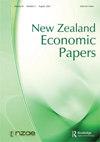私人消费模式中的损失厌恶或口碑行为
IF 0.7
Q3 ECONOMICS
引用次数: 0
摘要
本文章由计算机程序翻译,如有差异,请以英文原文为准。
Loss aversion or hand-to-mouth behaviour in private consumption models
This study empirically tests whether the loss aversion or hand-to-mouth theories of consumption behaviour is present in Fiji. The loss aversion hypothesis implies that consumers would maintain their consumption when income falls. To estimate this model, we apply the nonlinear autoregressive distributed lag model with annual data from 1981 to 2019. Our findings are in contrast to the predictions of the loss aversion hypothesis and support the hand-to-mouth hypothesis in Fiji. The results are robust to alternative measures of liquidity, and a sample that includes the COVID-19 pandemic. We contribute to the literature by providing evidence of nonlinearity’s in the consumption-income association. The findings are useful for policymakers in developing countries for policies on economic growth and stabilization.
求助全文
通过发布文献求助,成功后即可免费获取论文全文。
去求助
来源期刊

New Zealand Economic Papers
Economics, Econometrics and Finance-Economics, Econometrics and Finance (all)
CiteScore
1.20
自引率
0.00%
发文量
17
 求助内容:
求助内容: 应助结果提醒方式:
应助结果提醒方式:


